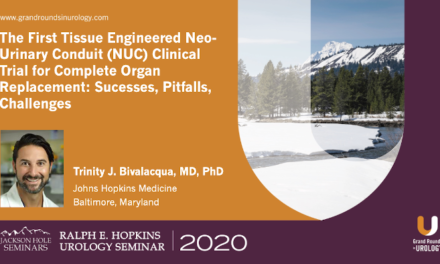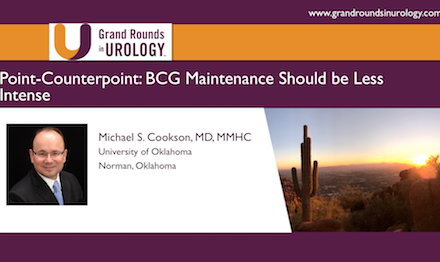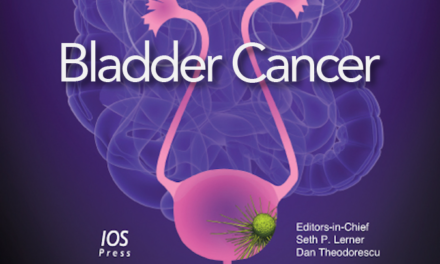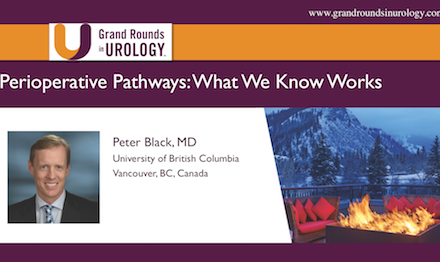Amirali Salmasi, MD, presented “Point-Counterpoint: Neoadjuvant Chemotherapy Prior to Cystectomy (Pro)” during the 29th Annual Perspectives in Urology: Point-Counterpoint, on November 18, 2021, in Coronado Island, San Diego, California.
How to cite: Salmasi, Amirali. “Point-Counterpoint: Neoadjuvant Chemotherapy Prior to Cystectomy (Pro).” November 18, 2021. Accessed Oct 2024. https://grandroundsinurology.com/point-counterpoint-neoadjuvant-chemotherapy-prior-to-cystectomy-pro/
Point-Counterpoint: Neoadjuvant Chemotherapy Prior to Cystectomy (Pro)
Taking the pro side in a point-counterpoint debate, Amirali Salmasi, MD, Assistant Professor of Urology at the University of California, San Diego, argues that neoadjuvant chemotherapy (NAC) should be offered to any “fit” patient with invasive bladder cancer before radical cystectomy (RC). After noting that survival outcomes for invasive bladder cancer after cystectomy are not great in general, Dr. Salmasi considers decades of trial data on the addition of NAC to RC. He looks at the SWOG-8710 trial, two Nordic trials, the BA06 30894 trial, a trial of ddMVAC, and more, all of which indicate that NAC improves outcomes significantly. Dr. Salmasi also notes that these trials did find that NAC increased perioperative risks. He then considers the potential role of adjuvant chemotherapy, observing that the limited data available suggest that NAC is superior to adjuvant treatment. Dr. Salmasi concludes with a brief discussion of how urologists and oncologists should optimize the use of NAC by researching therapy combinations, duration, patient selection, and biomarkers.
Watch Dr. Alan Bryce present the con side of this debate here.
About the 29th Annual Perspectives in Urology: Point Counterpoint conference:
Presented by Program Chair and Grand Rounds in Urology Editor-in-Chief E. David Crawford, MD, this conference brought together leading experts in urology, medical oncology, and radiation oncology to discuss and debate the latest topics in genitourinary cancers, primarily prostate cancer and bladder cancer. This interactive conference offered topical lectures, pro/con debates, interesting-case presentations, interactive panel discussions, and interactive audience and faculty networking.
ABOUT THE AUTHOR
Amirali Salmasi, MD, is a urologist with expertise in the management of genitourinary cancers in men and women, including bladder, prostate, kidney, ureteral, testicular, adrenal, and penile cancers. He provides a personalized, multidisciplinary approach to deliver the best possible treatment options (active surveillance, focal therapy, surgery, radiation, systemic treatments, or clinical trials) for his patients.
Dr. Salmasi performs advanced minimally invasive and complex open surgeries, such as robotic-assisted laparoscopic cystectomy, nerve-sparing prostatectomy, retro-peritoneal lymph node dissection, adrenalectomy, and partial nephrectomy.
He is also interested in translational research and clinical trials in urologic oncology, and his hope is to bridge the gap between the bench and clinical research. He has published over 50 articles in peer-reviewed journals.
Dr. Salmasi completed a urologic oncology fellowship at the University of California, Los Angeles, and a urology residency at Rutgers Robert Wood Johnson Medical School. As a first step towards a career in academic medicine and research, he also did a postdoctoral fellowship at Johns Hopkins School of Medicine. He earned his medical degree from Tehran University of Medical Sciences and holds a master's degree in clinical research (MSCR) from UCLA Clinical and Translational Science Institute.
He is a member of the American Urological Association, the Society for Urologic Oncology and the American Society of Clinical Oncology.




